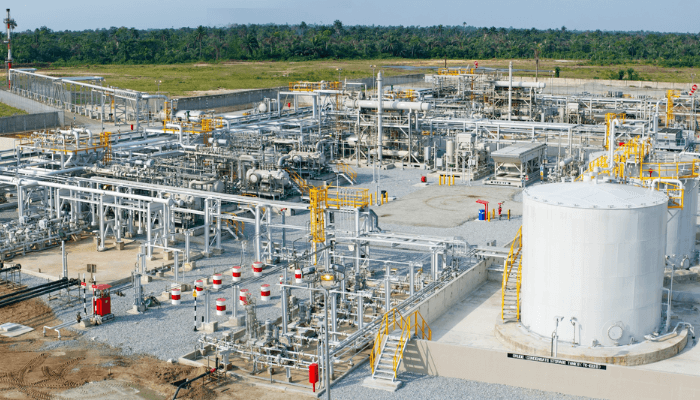Savannah Energy is advancing its ambitious $45 million gas compression project at the Uquo Central Processing Facility (CPF), setting the stage for increased capacity and efficiency in 2025.
According to the company’s recent financial update, significant milestones were achieved in the first half of 2024.
“In H1 2024, we completed the detailed engineering work, the procurement of all long lead items and the site preparation, piling and civil works. All remaining site installation works, including structural works, electrical and instrumentation, piping and mechanical works, and the compressor package installation itself, are nearing completion and pre-commissioning activities are underway,” Savannah Energy said in its latest financial statement.
The company noted that the $45 million compression project in Nigeria remains on budget and on track for completion during 2024, “enabling us to maintain and grow our gas production levels over the long-term and naira denominated debt facility signed with a consortium of five Nigerian banks”.
This is being progressively drawn down, with the resulting funds being converted to US$ to repay the existing Accugas US$ Facility.
An exploration well on the Uquo South prospect may be drilled at the same time as Uquo NE, targeting 154 billion cubic feet of potential in-place gas resource.
In 2024, Savannah said three gas contracts have been extended for a total of up to 105 MMcfd, which are due to expire in January 2025, July 2025 and June 2026.
Savannah said gross production from Uquo averaged 22,700 barrels of oil equivalent per day in the first 10 months of 2024, of which 88% was gas, equating to about 102 MMcfd.
The company’s $61.5 million acquisition of a company with a 49 percent stake in the producing Stubb Creek field in Nigeria — which holds 227 Bcf of untapped gas resources — is currently expected to receive regulatory consent in early 2025, with completion due shortly after, a deal that will boost Savannah’s stake in the asset to 100 percent.
In Niger, meanwhile, the company said it continues “to seek to progress” its 35 million-barrel, 10,000 barrels per day R3 East oil project, targeting exports via the Niger-Benin oil export pipeline, which it said is now fully operational and transporting some 90,000 bpd from China National Petroleum Corporation’s Agadem assets.
In South Sudan, Savannah said it remains in discussions with various stakeholders about “an alternative transaction structure” related to the proposed acquisition of the former Petronas assets.
The company said a future transaction would be on “significantly different terms” to the ill-fated December 2022 deal, “with the likely involvement of multiple acquiring parties”.
A UK-based minnow called Wildcat Petroleum is also interested in buying these assets.
The former Petronas assets are estimated to have produced an average of 81,000 bpd in the first 10 months of 2024, down from 150,000 bpd in 2023, due to problems with an export pipeline that transports a significant portion of the country’s oil production north through war-torn Sudan.
Discussing its failed acquisitions in Chad, Savannah said separate arbitral proceedings are underway against the Ndjamena-based government for nationalising upstream and midstream assets that the company said it had agreed to buy from ExxonMobil.
The upstream claim is for $840 million, while the midstream claim — covering a stake in the Chad-Cameroon export pipeline — is for $380 million.
“We expect the arbitral proceedings to be concluded in the second half of 2025,” said Savannah.
Oman’s state oil firm plans more unit listings after record IPO
OQ, the national oil company of Gulf producer Oman, plans to put more of its subsidiaries up for stock listing, following the record-breaking IPO of its OQ Exploration and Production Company earlier this year, a senior executive told Bloomberg in an interview.
In October, OQ Exploration and Production Company (OQEP), Oman’s wholly-state-owned upstream oil and gas operator, raised $2.03 billion from its IPO which was the largest ever for the Gulf oil nation and the biggest in the region so far this year.
OQEP sold 2 billion shares in the IPO during the subscription period, representing 25% of the company’s total issued share capital.
OQEP’s record-breaking listing in October was 2.4 times oversubscribed with orders amounting to about $4.7 billion. The offering that raised $2 billion from 25% of OQEP’s shares valued Oman’s oil and gas exploration firm at up to $8.1 billion (3.12 Omani billion rials).
Now OQ is looking to list more of its units on the local stock exchange, and the next share sale could take place at the end of 2025 or in 2026, OQ’s Chief People & Technology Officer, Ali Al Lawati, told Bloomberg in an interview published on Friday.
The proceeds from several share sales have helped the Omani state energy firm to reduce its debt by $6 billion in recent years—from $13 billion in 2021 to $7 billion now, Al Lawati told Bloomberg.
The IPO of the exploration firm in October followed the successful listings of two other OQ companies, Abraj Energy Services and OQ Gas Networks, last year.
Oman’s drilling and well services provider Abraj Energy Services, indirectly owned by OQ, was listed last year after an IPO raised $244 million (94 million rials). Pipeline operator OQ Gas Networks also debuted on the local stock market after raising $771 million in an IPO that sold out in one day.
